Syrian refugee students rebuild from Beirut
- Published
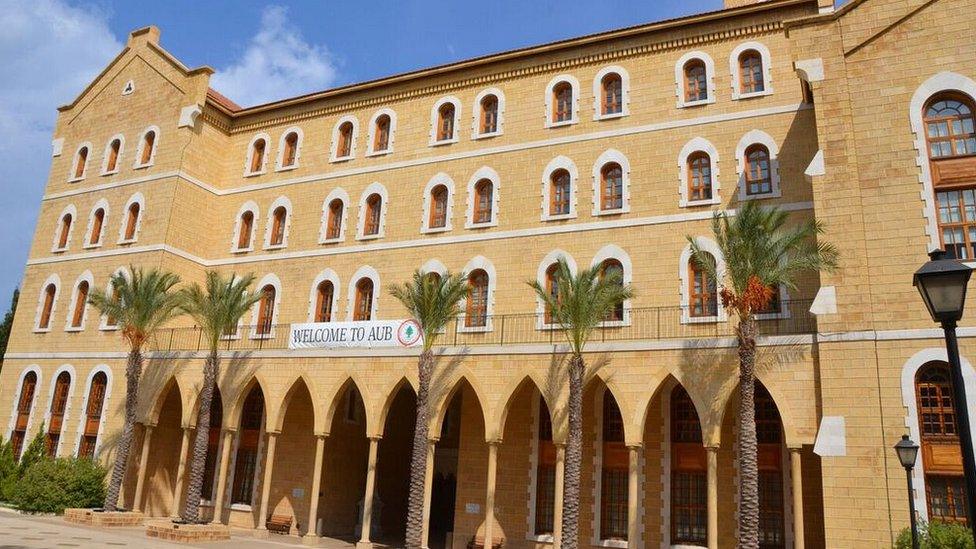
Syrian refugee students are being taught at the American University of Beirut
The destructive force of Syria's civil war has scattered refugees across its neighbouring countries.
Lebanon has about 1.5 million displaced Syrians, in a country smaller than Wales.
And "refugee" is not a temporary status, most will have been there for at least two years.
Many refugees are of school or college age and as well as feeding their bodies, there is a need to feed their minds.
Lebanon has pioneered the concept of the "double-shift" school, making the most of limited school buildings by pupils attending in two shifts per day.
But Syria's "lost generation" will also need higher-level skills. Any ambitions for rebuilding will depend upon the type of ideas and talents developed by a university education.
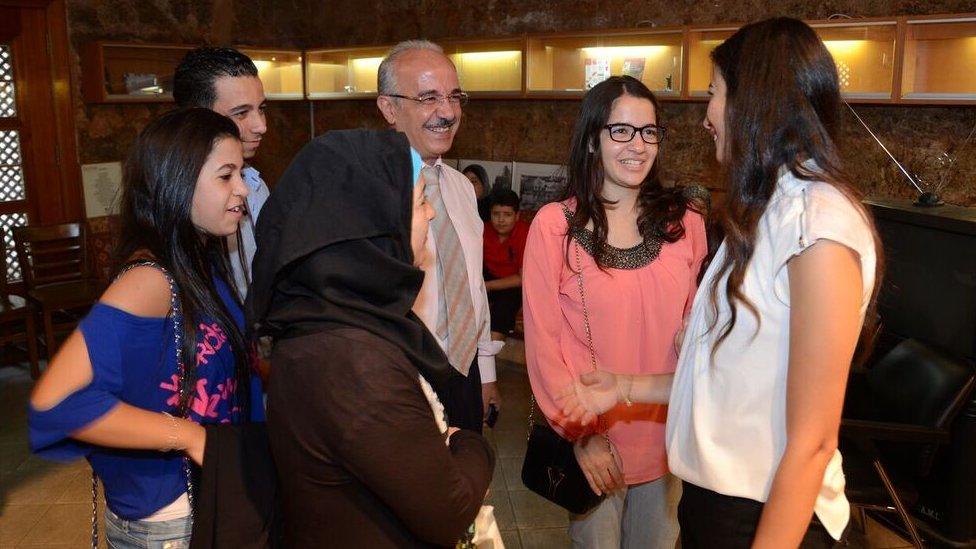
Scholars are supported through university and will have lessons in respecting the beliefs of others
The American University of Beirut is providing assistance, with a scholarship project to help young Syrian refugees become part of a post-war future.
But it's a tough starting point - and Rima Afifi, professor in the health sciences faculty, says the impact on Lebanon of the influx of Syrian refugees has been huge.
"It has affected every aspect of our lives. People have sometimes asked for the evidence. One of our faculty members said if I open my door it's right in front me. How much more evidence do you need than that?
"One in four people in Lebanon is now a Syrian refugee," she says.
It puts pressure on jobs, housing and health services as well as the education system - and it's not surprising that this causes friction.
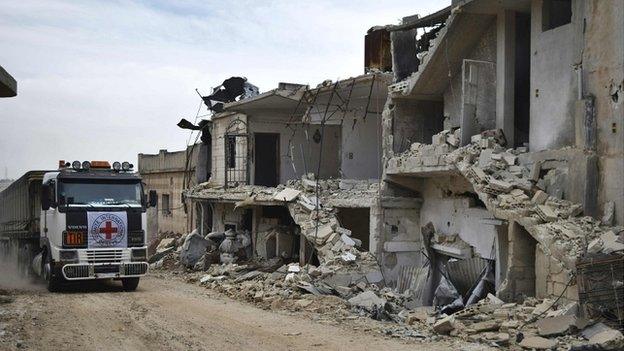
Any attempt at rebuilding Syria will need the return of its refugee students
"There's a lot of tension between the Lebanese population and the Syrians.
"It's one of the things I'm most concerned about. You feel like there's a potential for things to blow up."
These are the types of problems that you might not usually expect to be put at the door of a liberal arts college.
The American University of Beirut is a venerable 19th Century institution, which has continued through the region's wars and conflicts.
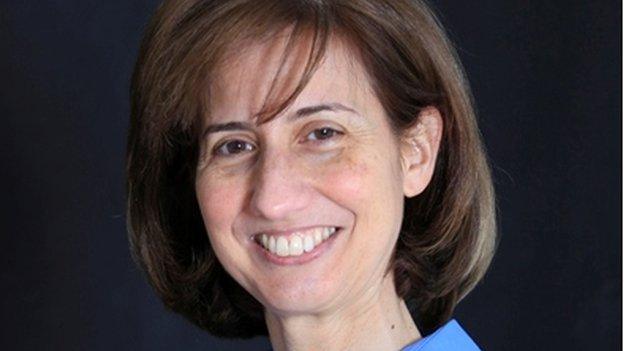
Rima Afifi says universities provide a model for a more tolerant society
The university scholarship scheme for Syrian students is part of a wider global project run by the Mastercard Foundation, which has supported 18,000 disadvantaged secondary school and higher education students, mostly from sub-Saharan Africa.
Prof Afifi runs the scholarship project in Beirut and says that a university can provide a role model of tolerance and open debate for a "hopefully more just society".
"There are people here from every faction - there's discussion and dialogue - in a way that's safe and provides a good basis for when they return to Syria," says Prof Afifi.
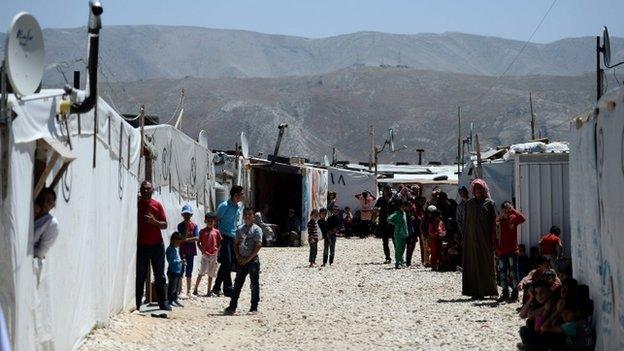
Many Syrian refugees will have been in Lebanon for several years
She also rejects the stereotyping of young refugees as "a problem, people who are going to be violent".
"All our work has shown that despite all this negativity, they are still hopeful and an asset to their community."
Before the civil war, about a quarter of young Syrians were going to university, but much of the country's higher education system now lies in rubble.
And the scholarships in Beirut are a way of reconnecting these youngsters with an opportunity that the war has taken from them.
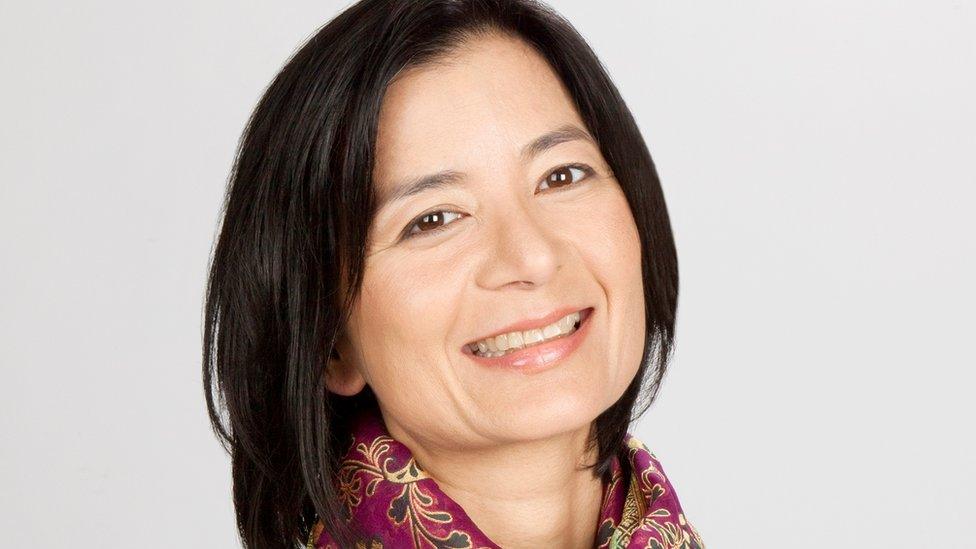
Mastercard Foundation head Reeta Roy says the project want to encourage open dialogue
The Mastercard Foundation has supported the American University of Beirut with $35m (£24m) in funding - and the foundation's president Reeta Roy describes it as a "remarkable institution" which shares the aims of the scholarship project.
"The whole ethos is about ensuring a commitment to pluralism, whether it's about diversity of faith, ideology or political views. It's really trying to get above those differences to promote civil dialogue, peace-making," said Ms Roy.
The foundation itself dates from 2006 when Mastercard became a public company. A slice of the money was set aside to endow a free-standing, independent foundation - and that is now worth about $11bn (£7.5bn), says Ms Roy.
Educating deprived youngsters is one of the biggest priorities, with hundreds of millions of dollars being spent on scholarships, covering fees, books and accommodation and providing support such as mentoring and job advice.
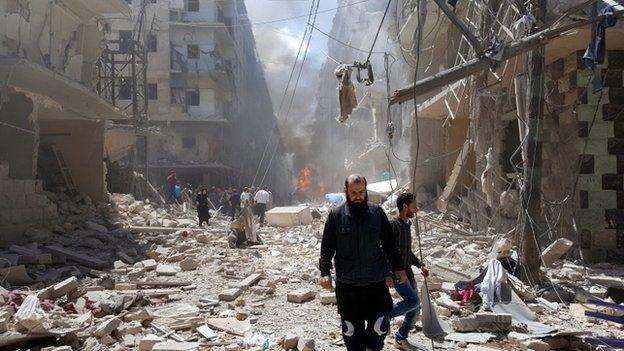
While Aleppo remains caught up in war, its exiled academics are planning how to rebuild it
Much has been targeted at the poorest countries in Africa, but there is an urgent need to help Syrians in Lebanon.
"No society rebuilds, no society progresses, unless it has the right kind of leaders, where different viewpoints can be aired. Education plays a huge role," says Ms Roy.
Prof Afifi says students at the Beirut university are taught "anti-oppression" lessons to challenge intolerance.
"In Lebanon, there is so much "othering". Depending on which sect or faction you are, you're "othering" everybody else," says Prof Afifi.
As well as religion, nationality and politics, these prejudices can be about gender or class.
"Let's be honest, let's look at these issues, let's put them on the table and see if we can deal with them. It's about interacting as humans rather than as someone who is different."
The AUB's president, Fadlo Khuri, said universities have to "take up the challenge of providing education for refugees".
"It is part of their larger commitment to equity and justice."

More stories from the BBC's Global education series, external looking at education from an international perspective and how to get in touch

Many of Syria's refugees have travelled much further than Lebanon.
Those who are in Hungary are being offered help by the Central European University in Budapest.
The university is opening its doors to refugees at weekends with volunteer academics offering courses in English, maths, philosophy, Hungarian culture and history and human rights law.
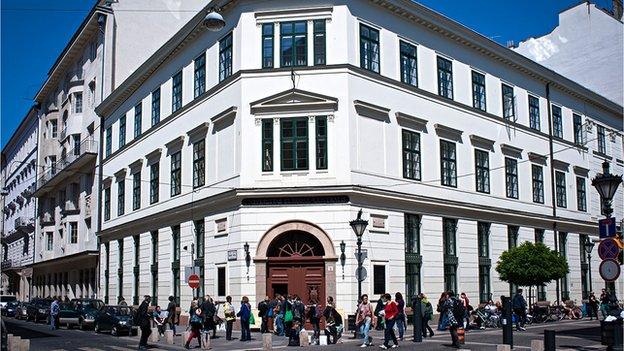
The Central European University in Budapest is running courses for refugees at weekends
The university in Budapest has another poignant project. Two Syrian academics from Aleppo are working on mapping and planning a virtual version of their city, in preparation for when it might be physically rebuilt after the war.
The Aleppo Project links the university with those still in the besieged city as it gathers information about damaged buildings that might one day be reconstructed or replaced.
Last week, the United Nations described conditions in the city as "catastrophic".
"It is hard to have much hope for Aleppo," says the project's blog. "One of the oldest continuously inhabited cities in the world has been torn apart by war.
"Rebuilding will take many decades, but it can start very suddenly. When that moment comes, it is important to be ready."